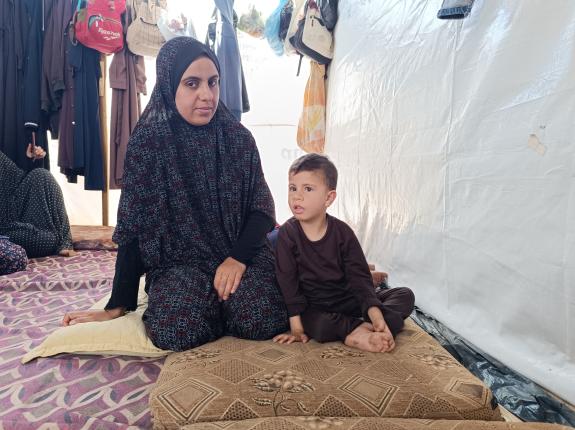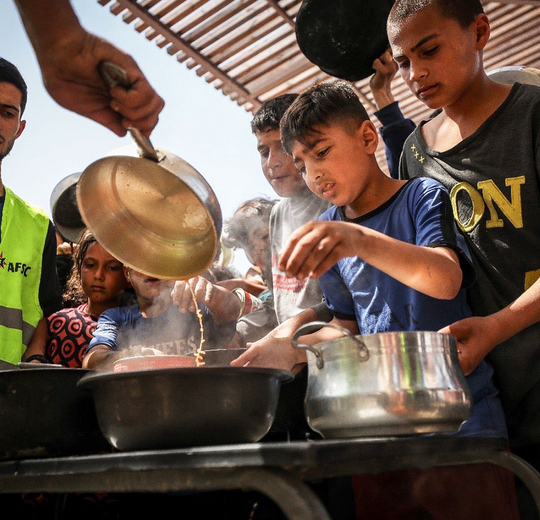My name is Najla Hani Al-Kafarnah, and I am 28 years old. We were displaced from our home on the second day of the war on Gaza on October 8, 2023. My husband was martyred on the third day of the war, leaving me alone with the responsibility of raising three children and taking care of them. I dream of providing security and safety for my children, and for the genocide we are facing to end soon, and for the life of humiliation we are living in to end.
I got married seven years ago to Jihad Adnan Al-Kafarnah. We were married in a small room in his family’s house in Beit Hanoun, in the north of the Gaza Strip, and lived a beautiful life together. Shortly after we got married, we built two rooms, a kitchen, and a bathroom of our own. God blessed us with three children: Adnan, six years old; Muhammad, five years old; and Adam, one year old. Our children were the main source of joy in our lives, and we were happy to live together in Beit Hanoun, where we were both born and raised. Our hearts were attached to Beit Hanoun, and we only left there when it became necessary. But now, we have been living far away from Beit Hanoun for nearly eight months due to the Israeli war on the Gaza Strip.
Before the war, I lived with my family in our house located on Atiya Al-Za’anin Street, in the Safiya area of Beit Hanoun. My son Muhammad was born with a permanent physical disability and requires special medical care. We have worked to provide care for him for the past five years.
We were displaced from our home on the second day of the war on Gaza on 8 October 2023. My husband, children, and I left Beit Hanoun for the Jabalia camp. We stayed in Abu Zeitoun School, affiliated with UNRWA. Our house was completely destroyed in the early days of the war.
We fled, surrounded by the occupation’s shells and missiles. We walked for over ten kilometres [6.2 miles] until we reached Jabalia camp, where we spent our first day in the shelter without food. We slept on the floor without blankets. My husband went out on the second day after our arrival to search for food and drink for us. The Israeli shelling on Jabalia camp was very intense.
I asked my husband to take care of himself and to stay away from the shelling areas. He told me that he would go to Jabalia camp market to get some food. About an hour after my husband left, I heard the displaced people in the school talking about Israeli shelling on Jabalia market. I started to feel extreme fear, and my heart began to beat fast. I tried to call my husband repeatedly, but the network was busy. My brothers went out to search for him, and they returned in the evening with sad faces. I knew that the situation was serious, but I didn’t think that I had lost my husband.
I ran towards my brothers and asked about my husband. They told me that he had been martyred in the Israeli shelling on Jabalia camp market on 9 October 2023. He was martyred in a shelling that resulted in a large massacre, in which dozens were killed or wounded. My husband was martyred on the third day of the war, leaving me alone with the responsibility of raising three children. This news was harsh, as I couldn’t even bid farewell to my husband. My brothers buried him in Jabalia camp cemetery without me being able to kiss him goodbye. They had to bury him quickly because of the intensity of the Israeli shelling that targeted all areas.
After my husband’s martyrdom, I lost the support I relied on for every aspect of my life. With the intensification of the shelling on Jabalia camp, I fled with my elderly father to Bait Lahia. We stayed in UNRWA school-turned-shelters for three days, but the area was also subjected to intense Israeli shelling. We then evacuated to the UNRWA health centre “Jabalia Clinic” in Jabalia camp, where we stayed for three days. On 14 October 2023, due to the intensified shelling on Jabalia camp, we left the northern Gaza Strip and headed south to Wadi Gaza, as requested by the occupation forces, as the southern Wadi areas were supposed to be safe.
We arrived in Khan Younis, in the southern Gaza Strip, after a long journey of suffering, during which we walked several kilometres on foot. We lived in a relative’s house. However, after a few days, the occupation bombed the house adjacent to ours, causing significant damage to the house we had evacuated to. My father asked us to leave Khan Younis and head to another safer area. Our only goal was to search for safety for ourselves and our children.
We left Khan Younis and headed to the Nuseirat camp in the central Gaza Strip. We stayed in Mamdouh Saeedam School with thousands of other displaced people in tents for two months. In early January 2024, the occupation planes dropped leaflets on us demanding the evacuation of Nuseirat camp. We immediately evacuated Nuseirat camp and headed to the tents for displaced people in Deir al-Balah. We have now been living in tents in the Akila area for the fifth consecutive month. Thousands of tents surround us on all sides. Tens of thousands of families live in adjacent tents. We are all seeking safety and constantly fleeing from the Israeli shelling, but it chases us wherever we flee.
I had not yet recovered from the news of my husband’s martyrdom when I received news of the martyrdom of several of my relatives. My husband’s sister, Ghada Adnan Al-Kafarnah, 46 years old, was martyred along with her sons: Mohammed, 29 years old; Anas, 23 years old; and Ramiz, 18 years old. My husband’s other sister, Najwa, 47 years old, was martyred along with her son Ahmed, 32 years old. They were all martyred in the same massacre in which my husband was martyred, the shelling on Jabalia camp market. In the massacre, I lost my husband and six of my relatives. They were all searching for food, fleeing from death, but the occupation’s missiles pursued them everywhere, taking their lives and depriving us of their beautiful presence in our lives. I lost my husband and six of my relatives in a single Israeli bombing.
The bombing that targeted the house we had evacuated to in Khan Younis resulted in injuries to my siblings. My brother Mahmoud, 23 years old, suffered bruises and contusions on his body. My sister Sajja, 19 years old, suffered severe burns on her body. My sister Fatima, 16 years old, suffered injuries and burns all over her body. My sister Aya, six years old, suffered bruises and contusions on her body. They stayed in Nasser Medical Complex in Khan Younis for several days and then joined us in the tents of Nuseirat camp, fleeing with us to the tents in Deir al-Balah.
Five years ago, Allah blessed me with my son Muhammad. Muhammad was born with cerebral atrophy, delayed motor skills, and significant cognitive impairments. Doctors informed me that he would require constant treatment, including regular physical therapy sessions, medical supplements, and ongoing medical monitoring. However, since the beginning of the war, Muhammad has been deprived of his treatment. He has lived with us in the displacement tents, fleeing from the occupation’s missiles in Jabalia camp, Beit Lahia, Khan Younis, and Nuseirat. Now, we are enduring hardship in Deir al-Balah.
We don’t have the financial means to support the specialized treatment for my disabled son. We have lost contact with the physical therapy team that had been treating Muhammad since the first day of the war. The occupation has completely destroyed the healthcare system in the Gaza Strip, and there are barely any functioning hospitals where treatment is available for Muhammad. Muhammad is five years old and weighs no more than ten kilograms [22 pounds], a weight that is not proportional to his age. His mental capacity is also much lower than his age.
I am always thinking about caring for my son Muhammad and how to provide what he needs. Muhammad needs diapers constantly, along with his specific medications and ongoing physical therapy sessions. He has required physical and mental therapy since birth. He needs dairy products, milk, and nutritional supplements rich in vitamins. He needs prescription glasses to correct his vision deviation. We need personal hygiene products for all of us. However, I am confronted with the reality of what we are currently living through.
We have lost everything because of the war. The occupation deprived my children of their father, bombed and destroyed our home, deprived my children of their right to live in a safe place, and deprived my disabled son Muhammad of his right to treatment. The occupation has deprived us of everything and destroyed our lives.
We have been living in tents for nearly eight months, and life in the tents is very sad. There is no water, and we cannot always find food. We eat only one meal a day, which is not enough. The temperatures are very high, and there are no sewage networks. Sewage and waste spread everywhere, and the foul odours are harmful. We face difficulty in providing for our daily needs. We live in an unhealthy and unsuitable environment, which poses many risks to my life and the lives of my children.
We were almost hit by the Israeli shelling near the tents. A house in Deir al-Balah next to the tents we live in was bombed, causing stones to fall on us. My brother was preparing food when the stones fell on the pot in which the food was being prepared, causing burns on his body from the boiling water. Danger follows us everywhere.
We miraculously survived after the occupation bombed the Al-Astal family’s house while we were displaced in Khan Younis. Civil defence and ambulance men managed to evacuate us from the shelling area and took us to Nasser Hospital. From there, we fled to Nuseirat camp. All this suffering, and I am responsible for three children alone, including a disabled child who needs to be carried constantly.
Take action now
Tell Congress to demand lifesaving aid for Gaza
The humanitarian crisis in Gaza has reached catastrophic levels. Since March 2, 2025, Israel—with full support from the U.S.—has severely restricted food, water, medicine, and humanitarian aid from entering Gaza.
Contact
If you have questions or concerns, please contact us at gazaunlocked@afsc.org.





